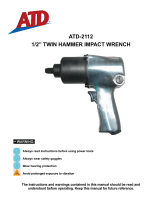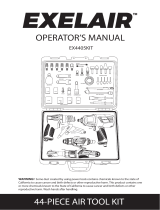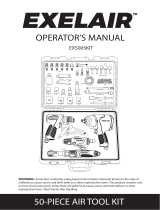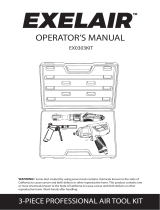Page is loading ...

1/2" AIR RATCHET WRENCH
ERN634ATL

1/2" AIR RATCHET WRENCH
GUARANTEE
This product carries a 2 year guarantee. If your product develops a fault within this
period, you should in the first instance contact the retailer where the item was purchased.
This guarantee specifically excludes losses caused due to:
- Fair wear and tear
- Misuse or abuse
- Lack of routine maintenance
- Failure of consumable items (such as batteries)
- Accidental damage
- Cosmetic damage
- Failure to follow manufacturer’s guidelines
- Loss of use of the goods
Congratulations on your purchase of a quality power tool from Erbauer (UK) Ltd. This
product should give you reliable service but for your peace of mind this
power tool does carry a 2 year guarantee, the terms of which are detailed below.
If this product develops a fault within the guarantee period contact your retailer.
Please retain this handbook in case you need to refer to safety, care or guarantee
information in the future.
Consumables supplied with this product are excluded from any guarantee offered.
This guarantee does not affect your statutory rights. This guarantee is only valid in the UK.

1/2" AIR RATCHET WRENCH
GENERAL SAFETY RULES
WARNING!
● Improper operation or maintenance of this tool could result in
personal injury and/or property damage. Read and understand all
warnings and operation instructions before using this tool.
● When using this tool, these basic safety precautions should always
be followed to reduce the risk of personal injury and/or property
damage.
Workplace conditons
1. Always work in a clean, dry, well-ventilated area free of combustible materials.
Never operate the tool near flammable substances such as gasoline, naphtha,
cleaning solvent, etc.
2. Dress properly. Do not wear loose clothing. Tie up or cover long hair, remove any
jewelry, necklaces, etc., which might become caught by the tool.
3. Keep the work area well lit and free of clutter. Slips, trips and falls are major causes
of workplace injury. Be aware of excess air hose left on your walking way or on the
working surface.
4. Ensure that there are no electrical cables, gas pipes, etc., which can cause a
hazard if damaged by use of the tool.
5. Keep visitors a safe distance from the work area. Keep children away.
Use of air tools
1. Stay alert and use common sense. Watch what you are doing. Do not operate the
tool when you are tired or under the influence of alcohol, drugs or medication.
2. Do not overreach. Keep proper footing and balance at all times.
3. Always wear eye protectors which provides protection from flying particles from the
front and side when using the tool. Ear protectors should also be worn.
4. Never use oxygen, carbon dioxide, combustible gases or any other type of bottled
gases as a power source for this tool.
5. Always verify prior to using this tool that the air source has been adjusted to the
rated air pressure range. Never connect to an air source that is capable of exceed-
ing 200psi.
6. Do not connect the air supply hose to the tool with your finger on the trigger.
7. Do not exceed the maximum working pressure 90psi/6.3bar for the tool. Excessive
pressure will reduce the tool life and/or might cause a hazardous situation.
8. Never leave the operating tool unattended. Disconnect the air hose when the tool is
not in use.
9. Keep the air supply hose away from heat, oil and sharp edges.
10. Check the air supply hose for wear and/or leaks before each use. Make sure that
all connections are tight and secure.
11. Do not use the tool for any other than its intended use.
12. Do not carry out any alternations and/or modifications to the tool.
13. Always disconnect the tool from air supply before replacing any accessories,
performing any repair and maintenance, moving to another work area, or passing
the tool to another person.

1/2" AIR RATCHET WRENCH
Air ratchet wrench safety instructions
1. Always use the ratchet wrench in the manner and for the functions described in this
manual.
2. Always ensure the wrench is not moving and disconnected from the air supply
when changing sockets etc. Only use impact sockets. Do not use standard
sockets.
3. Always finish tightening threaded fasteners, bolts or nuts, or engine parts with a
calibrated torque wrench by hand to the correct torque as recommended by the
manufacturer where critical torque values are required.
4. Where critical torque values are not required, the final tightening of threaded
fasteners, bolts or nuts can be slightly tighter if gaskets are used between surfaces.
5. Use penetrating oil to assist in freeing off rusted fasteners, bolts and nuts if
necessary.
6. When assembling, first turn fasteners, bolts or nuts by hand onto workpiece. Then
start the tool for tightening.
7. Always ensure that the socket is correctly installed onto the tool anvil before
starting the tool.
8. Never carry the ratchet wrench by the air supply hose.
9. Always disconnect the tool from the air supply when changing sockets or when the
wrench is not required for immediate use in order to avoid accidental start.
10. Always ensure that the wrench has come to a complete stop before putting it
down after use.
11. If necessary, use clamps or proper devices to securely fix the workpiece when
installing/tightening or removing/loosening threaded fasteners on the workpiece.
12. For overhead work, wear a safety helmet.
13. Do not discard the safety instructions, give them to the operator.
14. Always store this product in a dry and safe place out of reach of children or
untrained operators.
14. Never use the tool if it is defective, damaged, or operating abnormally.
15. Check for misalignment or binding of moving parts, breakage of parts and any
other condition that affects the tool operation. If damaged, have the tool serviced
before using.
16. Keep working parts of the tool away from hands and body.
17. Do not carry the tool by the air hose.
18. Do not apply excessive force of any kind to the tool. Let the tool perform the work
at the rate as it was designed.
19. Do not remove any labels on the tool. Replace if they become obscured or
damaged.
20. Always maintain the tool with care. Keep it clean for the best and safest perfor-
mance.
21. It is not recommended that quick change couplings should be located directly at
the air inlet, as they add weight and could fail due to vibration.
22. This tool vibrates with use. Continuous operation of this tool might be harmful to
your hands or arms. Stop using the tool if discomfort, a tingling feeling or pain
occurs. Resume work after recovery. Seek medical advice if a serious symptom
occurs.

1/2" AIR RATCHET WRENCH
WARNING! Compressed air can be dangerous. Ensure that you
are familiar with all precautions relating to the use of compres-
sors and compressed air supply.
1. Use only clean, dry, regulated compressed air as the power source.
2. Air compressors used with the tool must comply with the appropriate European
Community Safety Directives.
3. Make sure that the air compressor being used for the tool operation supplies the
correct output (CFM).
4. Have the tool in "off" position when connecting the tool to the air supply.
5. Use normal 90psi working pressure for the tool. High pressure and unclean air will
shorten the tool life due to the faster wear and also may create a safety hazard.
6. Drain water from the air compressor tank daily, as well as any condensation in the
air lines. Water in the air line may enter the tool and cause damage to the tool
mechanisms at operation.
7. Clean the tool air inlet screen filter for blockage weekly. Clean if necessary.
8. Usually a 3/8" (inner diameter) air hose is recommended for air supply and airflow
to get the optimum performance of tool.
9. A long air hose (usually over 8 meters) may cause up to 15psi drop in pressure, so
you need to set the output pressure of the air compressor higher to maintain the
required working pressure at the tool.
10. Use proper hoses and fittings. We do not suggest connecting quick change
couplings directly to the tool since they may cause failure due to tool vibration at
operation. Instead, add a lead hose and connect coupling between air supply and
hose whip.
11. Check hoses for wear before each use. Make certain that all connections are in
security.
AIR SUPPLY
6. Shut Off Valve
7. Whip Hose
8. Coupler Body And Connector
9. Drain Daily
10. 1/2" Or Larger Pipe And Fitting
AIR SYSTEM LAYOUT
1. Air Tool
2. Air Hose 3/8" (I.D.)
3. Oiler
4. Pressure Regulator
5. Filter
11. Air Dryer
12. 1" Or Larger Pipe And Fitting
13. Air Compressor
14. Auto Drain
15. Drain Daily
6
9
13
14
15
8
7
12
10
5
4
3
2
11
1
Please refer to the typical air system layout recommended below.

1/2" AIR RATCHET WRENCH
On the product, the rating label and within these instructions you will find among
others the following symbols and abbreviations. Familiarise yourself with them to
reduce hazards like personal injuries and damage to property.
SYMBOLS
Revolution per minute
Pound per square inch
RPM
PSI
CFM Cubic feet per minute
Caution / Warning.
Read the instruction manual.
Wear hearing protection.
Wear eye protection.
xxWxx
Manufacturing date code; year of manufacturing (20xx) and week of
manufacturing (Wxx)
SN
Serial number
The product complies with the
applicable European directives
and an evaluation method of
conformity for these directives
was done.
Wear protective gloves.

1/2" AIR RATCHET WRENCH
PRODUCT DESCRIPTION
DESCRIPTION
QUANTITY
PART
F/R Knob
Exhaust Deflector
1/2" Air Ratchet Wrench
Steel Ball
Air Inlet
Air Regulator
Trigger
Anvil
1
1
1
1
1
1
1
1
A
B
C
D
E
F
G
H
H
A
G
C
F
E
D
B

1/2" AIR RATCHET WRENCH
VIBRATION
The European Physical Agents (Vibration) Directive has been brought in to help
reducehand arm vibration syndrome injuries to power tool users. The directive requires
power tool manufacturers and suppliers to provide indicative vibration test results to
enable users to make informed decisions as to the period of time a power tool can be
used safely on a daily basis and the choice of tool.Further Advice can be found at
www.hse.gov.uk
The declared vibration emission value should be used as a minimum level should be
used with the current guidance on vibration.
Calculating the actual period of the actual period off use can be difficult and the HSE
website has further information.
The declared vibration emission been measured in accordance with a standardised
test stated above and may be used to compare one tool with another.
The declared vibration emission value may also be used in a preliminary assessment
of exposure.
- The declared vibration total value has been measured in accordance with a standard
test method and may be used for comparing one tool with another.
- The declared vibration total value may also be used in a preliminary assessment
of exposure.
TECHNICAL SPECIFICATIONS
WARNING! The vibration emission during actual use of the power tool
can differ from the declared total value depending on the ways in which
the tool is used; and of the need to identify safety measures to protect the
operator that are based on an estimation of exposure in the actual
conditions of use (taking account of all parts of the operating cycle such
as the times when the tool is switched off and when it is running idle in
addition to the trigger time).
NOISE AND VIBRATION DATA
Sound pressure level LPA: 87 dB (A) (K=3dB(A))
Sound power level LWA: 98 dB (A) (K=3dB(A))
Vibration level: 4.35m/s
2
(K = 1.5m/s
2
)
SPECIFICATIONS
COMPONENT
1/2"
160rpm
60Ft-Lb (85Nm)
1/4" BSP
3/8"
4cfm
90psi (6.3bar)
Square drive
Maximum no load speed
Maximum torque
Air inlet
Air hose (inner diameter)
Average air consumption
Working pressure

1/2" AIR RATCHET WRENCH
INTENDED USE
This 1/2" air ratchet wrench ERN634ATL is compact and ergonomic for working in
confined spaces. It features 4-speed air regulator and rotatable exhaust deflector.
The intended use includes installing/tightening or removing/loosening threaded
fasteners and/or small bolts in automotive and garage, and in other workshop
applications as well.
For safety reasons it is essential to read the entire instruction manual before first
operation and to observe all the instructions therein.
This product is intended for private domestic use only, not for any commercial trade
use. It must not be used for any purposes other than those described.
UNPACK
1. Unpack all parts and lay them on a flat, stable surface.
2. Remove all packing materials and shipping devices if applicable.
3. Make sure the delivery contents are complete and free of any damage. If you find
that parts are missing or show damage do not use the product but contact your
dealer.
4. Using an incomplete or damaged product represents a hazard to people and
property.
5. Ensure that you have all the accessories and tools needed for assembly and
operation. This also includes suitable personal protective equipment.
This tool may cause hand-arm vibration syndrome
if its use is not adequately managed
WARNING! The vibration emission value during actual use of the power
tool can differ from the declared value depending on the ways in which
the tool is used dependant on the following examples and other variations
on how the tool is used:-
How the tool is used and the materials being worked with.
The tool being in good condition and well maintained.
The use of the correct accessory for the tool and ensuring it is in good
condition.
And the tool is being used as intended by its design and these instructions.
WARNING! identify safety measures to protect the operator that are
based on an estimation of exposure in the actual conditions of use
(taking account of all parts of the operating cycle such as the times when
the tool is switched off and when it is running idle in addition to the trigger
time). Note The use of other tools will reduce the users’ total working
period on this tool. Helping to minimise your vibration exposure risk.
ALWAYS use impact sockets. Maintain this tool in accordance with these instructions
and keep well lubricated (where appropriate).
Plan your work schedule to spread any high vibration tool use across a number of days.
Health Surveillance
All employees should be part of an employer’s health surveillance scheme to help
identity any vibration related diseases at an early stage, prevent disease progression
and help employees stay in work.

1/2" AIR RATCHET WRENCH
ASSEMBLY
E
2
3
E
1
1. Remove the air inlet protective cap from the
air inlet (E). (See Figure 1)
3. Place 2 - 3 drops of air tool oil (not included)
into the male plug before each use.
(See Figure 3)
2. Mount the male plug by hand into the air
inlet (E). (See Figure 2)
NOTE: Use thread sealant tape
(not included) on the male plug and
tighten it with a wrench for airtight
connection. Do not overtighten.

1/2" AIR RATCHET WRENCH
OPERATION
5
H
4
H
A
G
6
4. Choose the correct impact socket
(not provided) as needed and mount it onto
the anvil (H). (See Figure 4)
1. How to install/tighten threaded fasteners.
Turn the F/R knob (A) counterclockwise to “F”
position (F=Forward or Tighten). Press the
trigger (G). The tool anvil (H) runs clockwise.
(See Figure 6)
5. Connect air supply hose to the male plug.
(See Figure 5)
WARNING! Only use impact sockets
that have a RPM and Torque rating
equal to or greater than the tool itself.
6. Set the working pressure at 90psi/6.3bar for
best tool performance.
NOTE: Working pressure refers to the
air line pressure set to tool when tool
is under working conditions.

1/2" AIR RATCHET WRENCH
B
H
A
G
2. How to remove/loosen threaded fasteners.
Turn the F/R knob (A) clockwise to “R” position
(R=Reverse or Loosen). Press the trigger (G).
The tool anvil (H) runs counterclockwise.
(See Figure 7)
7
9
8
E
D
F
NOTE: This tool features a power
regulator valve. Rotate the air regulator
(F) until desired output is achieved. The
settings 1, 2, 3, 4 are only for reference
and do not denote a specific power
output. “Setting 1” (one-line symbol) is
the least amount of power while
“Setting 4” (four-line symbol) is the most
amount of power. Rotate the air
regulator (F) until the desired setting is
lined up with the small steel ball (D) on
air inlet (E). (See Figure 8)
NOTE: This tool features an exhaust
deflector (B) 9 which can be rotated to
any position to direct air away from
workpiece or operator. (See Figure 9)

1/2" AIR RATCHET WRENCH
1. Flush the tool with air-tool oil or gum
solvent.
2. Lubricate the tool.
3. a. Adjust the regulator on the tool to
maximum setting.
b. Adjust the compressor regulator to tool
maximum of 90 PSI/6.3 BAR.
4. Tighten and seal hose fittings if leaks are
found. Use sealing tape.
5. a. Be sure the hose is the proper size.
Long hose or tools using large volumes
of air may require a hose with an I.D. of
1/2 in. or larger depending on the total
length of the hoses.
b. Do not use a multiple number of hoses
connected together with quick-connect
fittings. This causes additional pressure
drops and reduces the tool power.
Directly connect the hoses together.
6. Replace rotor blade.
7. Water in tank; drain tank. (See air
compressor manual). Oil tool and run
until no water is evident. Oil tool again
and run 1-2 seconds.
Tool runs
slowly or will
not operate
1. Grit or gum in tool.
2. No oil in tool.
3. Low air pressure.
4. Air hose leaks.
5. Pressure drops.
6. Worn rotor blade.
7. Moisture blowing
out of tool exhaust.
PROBLEM
TROUBLESHOOTING
CORRECTIVE ACTIONPOSSIBLE CAUSE
CARE AND MAINTENANCE
An in-line oiler is recommended to be installed on air supply line as it increases tool
life and keeps the tool in sustained operation. The in-line oiler should be regularly
checked and filled with air-tool oil. Proper adjustment of the in-line oiler is performed
by placing a sheet of paper next to the tool's exhaust ports and holding the throttle
open approximately 30 seconds. The in-line oiler is properly set when a light stain of
oil collects on the paper. Excessive amounts of oil should be avoided.
In the event that it becomes necessary to store the tool for an extended period of
time, it should receive a generous amount of lubrication at that time. The tool should
be run for approximately 30 seconds to ensure oil has been evenly distributed
throughout the tool. The tool should be stored in a clean and dry environment.
Recommended lubricants: use air-tool oil or any other high-grade turbine oil
containing moisture absorbent, rust inhibitors, metal wetting agents and an EP
(extreme pressure) additive.
Clean the tool all over with a cotton rag after each use. Keep the tool in a dry and
safe place out of reach of children.

1/2" AIR RATCHET WRENCH
EXPLODED DIAGRAM AND PARTS LIST
Part No.
Description
Qty.
Part No.
Description
Qty.
1
2
3
4
5
6
7
8
9
10
11
12
13
14
15
16
17
18
19
20
21
22
23
24
25
26
27
28
Main housing
Bolt
Trigger
Bolt
Soft grip
Rear cover
Valve seat
Bolt
Throttle valve
Spring
Screw cap
O-ring
Air regulator
Set plate
O-ring
Set plate
Gasket
Air inlet
Front cover
Clip
O-ring
Exhaust deflector
Bearing cap
Bearing
Rear plate
Rotor
Rotor blade
Cylinder
1
1
1
1
1
1
1
1
1
1
1
1
1
1
1
1
1
1
1
1
1
1
1
1
1
1
4
1
29
30
31
32
33
34
35
36
37
38
39
40
41
42
43
44
45
46
47
48
49
50
51
52
53
54
55
56
Pin
Front plate
Bearing
Washer
Thread ring gear
Idle gear
Gear pin
Gear plate
Clamp nut
Ring gear
Bushing
Crankshaft
Drive bushing
Ratchet housing
Ratchet yoke
F/R knob
Sleeve
Spring
Washer
Ratchet head
Pin
Ratchet pawl
Thrust washer
Retainer spring
Spring
Steel ball
Spring
Steel ball
1
1
1
1
1
3
3
1
1
1
1
1
1
1
1
1
2
2
1
1
2
2
1
1
1
1
2
2
27
26
20
19
6
5
2
55
56
51
52
48
50
49
54
53
45
47
46
44
43
42
33
39
7
25
29
9
24
23
10
22
21
32
31
30
1
28
41
40
37
35
36
34
38
3
4
8
18
16
15
17
14
13
12
11

1/2" AIR RATCHET WRENCH
DECLARATION OF CONFORMITY
Standard and technical specifications referred to:
EN ISO 11148-6: 2012
Authorised Signatory and technical file holder
Date: 05/05/2015
Signature:
Name / title: Peter Harries / Quality Manager
Erbauer (UK) Ltd. Trade House, Mead Avenue, BA22 8RT
.
Complies with the following Directive(s),
EC Machinery Directive 2006/42/EC
We, Importer
Erbauer (UK) Ltd BA22 8RT
Declare that the product
Description: 1/2" Air Ratchet Wrench
Model: ERN634ATL

1/2" AIR RATCHET WRENCH
/



